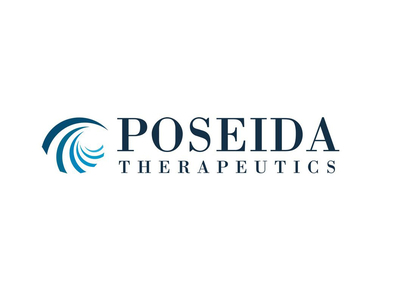SAN DIEGO, Sept. 16, 2020 /PRNewswire/ -- Poseida Therapeutics, Inc., (Nasdaq: PSTX), a clinical-stage biopharmaceutical company dedicated to utilizing proprietary gene engineering platform technologies to create next generation cell and gene therapeutics with the capacity to cure, today will present data related to its proprietary manufacturing process designed to optimize its CAR-T product candidates. The Company will also illustrate the impact of these optimizations with preclinical data and preliminary clinical analysis with a focus on P-BCMA-101, its autologous CAR-T product candidate for multiple myeloma. The findings will be presented today at CAR-TCR Digital Week 2020 being held September 14-17, 2020.

Utilizing its proprietary piggyBac® DNA Modification System, Poseida's non-viral manufacturing process can produce highly purified CAR-T treatment candidates comprised of a high percentage of stem cell memory T, or TSCM, cells. These high-TSCM product candidates may improve therapeutic response and tolerability profile as compared to existing CAR-T therapies using viral-based manufacturing methods.
In ongoing efforts to optimize manufacturing, the Company was able to demonstrate increased transposition frequency by using Nanoplasmid™ technology licensed from Nature Technology Corporation, which, when compared to a standard plasmid, yields more CAR-positive cells at the start of the process. In turn, this reduces manufacturing timelines, has resulted in a higher proliferative capacity in patients, and has the potential to create more efficacious CAR-T products with less toxicity.
Poseida also conducted a preliminary clinical analysis of P-BCMA-101 to test the impact of using a Nanoplasmid in its manufacturing process compared to a standard plasmid. The analysis conducted at a .75 X 10E6 per kg dose found that all patients (n=3) responded to treatment with Nanoplasmid-manufactured P-BCMA-101 and that responses were deep, showing a 100 percent overall response rate (ORR) as compared to an ORR of 50-67% in patients that received P-BCMA-101 manufactured using a standard plasmid at that same dose (n=3, 2 evaluable by IMWG criteria; third patient with plasmacytomas and significant response by PET scan). The three patients given Nanoplasmid-produced P-BCMA-101 at this dose reached a very good partial response (VGPR) or stringent complete response (sCR) compared to a partial response (PR) achieved with the standard plasmid. Notably, using a Nanoplasmid in the manufacturing process did not impact the safety profile of P-BCMA-101 and no incidence of cytokine release syndrome of any grade was observed in patients.
"At Poseida, we are always looking at innovative ways to further improve the performance of our CAR-T product candidates while maintaining an exceptionally low rate of cytokine release syndrome and other potential toxicities," said Eric Ostertag, M.D., Ph.D., Chief Executive Officer of Poseida. "As our most advanced product candidate, we look forward to providing further updates to our clinical program for P-BCMA-101 later in the year."
P-BCMA-101 has received regenerative medicine advanced therapy (RMAT) status and orphan drug designation from the FDA and is currently being tested in an expanded Phase 1 clinical trial for the treatment of patients with relapsed/refractory multiple myeloma to inform the potentially registrational Phase 2 clinical trial. Poseida's portfolio includes allogeneic and autologous CAR-T product candidates in both hematological and solid tumor oncology indications, as well as liver-directed gene therapy programs in orphan genetic diseases.
Nanoplasmid-produced product candidates P-BCMA-101 for multiple myeloma and P-PSMA-101 for castrate resistant prostate cancer have both demonstrated robust expansion in patients to date. The Company is now utilizing Nanoplasmid technology to manufacture all autologous and allogeneic product candidates across its portfolio and continues to evaluate additional manufacturing optimizations that may further improve the performance of its product candidates.
The full presentation at CAR-TCR Digital Week will be available on Poseida's website at the end of the meeting on Thursday, September 17.
About Poseida Therapeutics, Inc.
Poseida Therapeutics is a clinical-stage biopharmaceutical company dedicated to utilizing our proprietary gene engineering platform technologies to create next generation cell and gene therapeutics with the capacity to cure. We have discovered and are developing a broad portfolio of product candidates in a variety of indications based on our core proprietary platforms, including our non-viral piggyBac® DNA Modification System, Cas-CLOVER™ site-specific gene editing system and nanoparticle- and AAV-based gene delivery technologies. Our core platform technologies have utility, either alone or in combination, across many cell and gene therapeutic modalities and enable us to engineer our wholly-owned portfolio of product candidates that are designed to overcome the primary limitations of current generation cell and gene therapeutics.
About Nature Technology Corporation
Nature Technology Corporation is a developer of safe and effective nucleic acid-based gene therapeutics, DNA vaccines, and associated technologies, including antibiotic-free selection (RNA-OUT), regulatory compliance, viral vector retrofitting, and best in class NanoplasmidsTM. NTC proprietary vector and manufacturing platforms offer wide applications to improve the safety and performance of plasmids and biologics.
Forward-Looking Statements
Statements contained in this press release regarding matters that are not historical facts are "forward-looking statements" within the meaning of the Private Securities Litigation Reform Act of 1995. Such forward-looking statements include statements regarding the preclinical and clinical data presented, the potential benefits of Poseida's technology platforms and product candidates and Poseida's plans and strategy with respect to developing its technologies and product candidates. Because such statements are subject to risks and uncertainties, actual results may differ materially from those expressed or implied by such forward-looking statements. These forward-looking statements are based upon Poseida's current expectations and involve assumptions that may never materialize or may prove to be incorrect. Actual results could differ materially from those anticipated in such forward-looking statements as a result of various risks and uncertainties, which include, without limitation, risks and uncertainties associated with development and regulatory approval of novel product candidates in the biopharmaceutical industry and the other risks described in Poseida's filings with the Securities and Exchange Commission. All forward-looking statements contained in this press release speak only as of the date on which they were made. Poseida undertakes no obligation to update such statements to reflect events that occur or circumstances that exist after the date on which they were made, except as required by law.
SOURCE Poseida Therapeutics, Inc.


